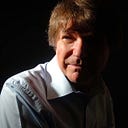Member-only story
Closing in on that elusive Theory of Everything
One of the greatest problems of science, a Theory of Everything, or unified field theory, to embrace and explain completely all aspects of the universe, could be closer to a solution with two new theories, both notable for their metaphysical elements, now in play
Back in 1975, the Austrian-born physicist Fritjof Capra published a ground-breaking, best-selling but controversial book entitled The Tao of Physics: An exploration of the parallels between modern physics and Eastern mysticism.
From the outset, Capra admitted he’d been inspired by the use of ‘power plants’, or psychedelics, and he received both praise and criticism from within the scientific community. His book went through five editions up to 2010, and has been translated into 23 languages.
And the idea of applying Taoist thought to aspects of Western culture caught on in a big way. Today, the GoodReads website lists no fewer than a hundred ‘The Tao of …’ titles, from Architecture to Music to Psychology to Sex to Writing, even to Elvis, Jung and Jesus.
The ancient Chinese philosophy of Taoism is about the way of cooperating with the course or trend of the natural world, the correct or proper way of existence, the Tao itself relating to what might be described as the flow of the universe, to some energy behind the material…
